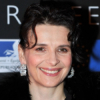Juliette Binoche

Juliette Binoche
Juliette Binocheis a French actress, artist and dancer. She has appeared in more than 40 feature films, been recipient of numerous international awards, and has appeared on stage and in movies across the world. Coming from an artistic background, she began taking acting lessons during adolescence. After performing in several stage productions, she began acting in films by auteur directors Jean-Luc Godard, Jacques Doillonand André Téchiné, who made her a star in France with the leading role in his 1985...
NationalityFrench
ProfessionMovie Actress
Date of Birth9 March 1964
CityParis, France
CountryFrance
I don't believe in coincidence.
I believe that being an actress or being involved in a movie has to be a life experience, otherwise why go for it? I have to change me, and I have to learn things, and I have to push me and my limits. By acting, I find a freedom inside of a prison in a way.
Being a famous actress may give you a sense of being important, but believe me, it's just an illusion.
But, you know, when I choose a film I need to believe in it and believe I can do something special with it, and after a while that means not trying to judge or analyze why I should do it. You have to follow this intuition thing, which is a mystery to me.
I believe such illumination comes if you're open to the surprises the universe throws at you. You must be able to let go of the past, whatever success you may have seen, whatever your comfort, whatever your habits. To me, that's the key to loving life: Enabling yourself to step bravely into the unknown. Only there will you find yourself again.
I learned a lot last year about the current difficulties in independent film making. Money is promised one minute and gone the next. I was bitterly disappointed about Scheherazade. It was one of the best scripts I have ever read.
Movies are open doors, and at every door, I change character and life... I live for the present always. I accept this risk. I don't deny the past, but it's a page to turn.
You have to have the courage to wait, to say no, ... And that's difficult. This job is very uncertain, and it's frightening.
Something triggers inside her when her husband focuses on the little girl, ... She feels abandoned. Finding this man who represents unity, being Jewish, solid, family-oriented, it triggers something deep in her that reassures her. And when he changes his focus, she feels completely abandoned.
I wanted to have an international career, which I have, and be free to work with whoever I wanted to work with. My instinct was to go back to France afterwards. I went to do a small film, then I went back and forth.
The themes have to do with immigration, our past, and are we guilty when we're 6 years old, ... For me, the big subject is not what my husband in the film (Daniel Auteuil) has done as a child, but in not recognizing his fault, he's damaged someone's life. The theme is universal; it doesn't just belong to the French-Algerian past, but triggers something we all can share.
I've never thought of my characters as being sad. On the contrary, they are full of life. They didn't choose tragedy. Tragedy chose them.
We're here to be with her, and to help her in a spiritual way. I think our presence here is a way to sustain the possibility of freedom.
My experience has nothing to do with creation, I don't think, even though maturity is helpful. In a creation process, there's an intuition that takes you and if it's nourished with awareness and experience, it's great.